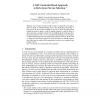Free Online Productivity Tools
i2Speak
i2Symbol
i2OCR
iTex2Img
iWeb2Print
iWeb2Shot
i2Type
iPdf2Split
iPdf2Merge
i2Bopomofo
i2Arabic
i2Style
i2Image
i2PDF
iLatex2Rtf
Sci2ools
ICSOC
2010
Springer
2010
Springer
A Soft Constraint-Based Approach to QoS-Aware Service Selection
Abstract. Service-based systems should be able to dynamically seek replacements for faulty or underperforming services, thus performing self-healing. It may however be the case that available services do not match all requirements, leading the system to grind to a halt. In similar situations it would be better to choose alternative candidates which, while not fulfilling all the constraints, allow the system to proceed. Soft constraints, instead of the traditional crisp constraints, can help naturally model and solve replacement problems of this sort. In this work we apply soft constraints to model SLAs and to decide how to rebuild compositions which may not satisfy all the requirements, in order not to completely stop running systems.
Applied Computing | ICSOC 2010 | Service-based Systems | Soft Constraints | Traditional Crisp Constraints |
Related Content
| Added | 26 Jan 2011 |
| Updated | 26 Jan 2011 |
| Type | Journal |
| Year | 2010 |
| Where | ICSOC |
| Authors | Mohamed Anis Zemni, Salima Benbernou, Manuel Carro |
Comments (0)

